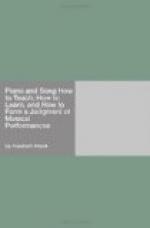MRS. SOLID. Your careful mode of proceeding is certainly extremely interesting and convincing; but allow me to request an answer to various objections and considerations which are now and then brought forward, particularly by teachers.
DOMINIE. To that I am quite accustomed. The good and the beautiful never obtain uncontested recognition. No one has ever offered any new improvement, and fearlessly spoken the truth, without being attacked, defamed, and despised, or entirely misunderstood. Our age can show many proofs of this; for example, let us remember homoeopathy and magnetism. Clara Wieck was not appreciated in Leipzig until she had been admired in Paris; nor Marie Wieck, because she does not play exactly as her sister Clara does. The same is the case with my present book, which relentlessly treads upon the incredible follies and lamentable errors of the times. I am quite prepared for opposition of any kind.
MRS. SOLID. I should like to suggest to you that there are other teachers who have given themselves a great deal of trouble, and who are very particular; but it is not their good fortune to have daughters like yours to educate.
DOMINIE. Have given themselves a great deal of trouble? What do you mean by that? If they do not take pains in the right way, or at the right time and place, it is all labor in vain. Of what use is mere unskilful, stupid industry? For instance, when a teacher, in order to correct a stiff use of the fingers and wrist, and the general faulty touch of his pupil, gives some wonderful etude or a piece with great stretches and arpeggios for the left hand, and gives himself unwearied trouble over it, it is a proof of abundant painstaking; but it is labor thrown away, and only makes the imperfect mode of performance the worse.
And now with regard to my daughters. It has been their fortune to have had me for a father and teacher: they certainly have talent, and I have been successful in rousing and guiding it. Envy, jealousy, pride, and offended egotism have tried as long as possible to dispute this; but at last the effort is abandoned. They say that it requires no art to educate such talent as theirs, that it almost “comes of itself.” This assertion is just as false and contrary to experience as it is common, even with educated and thoughtful people, who belong to no clique. Lichtenburg says: “It is just those things upon which everybody is agreed that should be subjected to investigation.” Well, I have made a thorough investigation of these accusations, with regard to my three daughters, and all the talented pupils whom I have been able to educate for good amateurs, and, according to circumstances, for good public performers. The great number of these suffices for my justification. I must add, still further, that it is exactly the “great talents” for singing, or for the piano, who require the most careful, thoughtful, and prudent guidance. Look around at the multitude of abortive talents and geniuses! Talented pupils are just the ones who have an irresistible desire to be left to their own discretion; they esteem destruction by themselves more highly than salvation by others.




